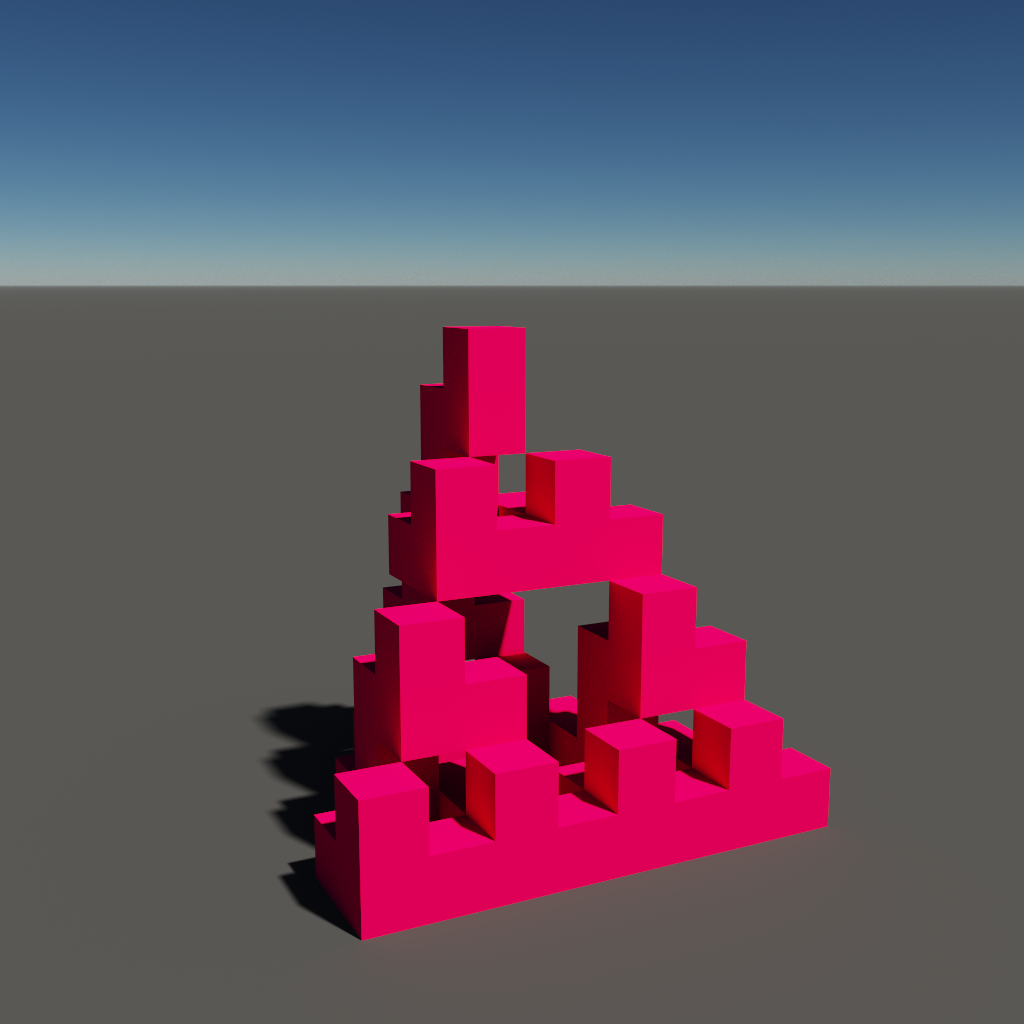# MagicaX
[](https://hex.pm/packages/magicax)
[](https://hexdocs.pm/magicax/)
A comprehensive Elixir toolkit for parsing and generating MagicaVoxel (.vox) files.

## Features
### 🔍 Parser (`MagicaX.VoxParser`)
- **Complete VOX parsing** - 100% data coverage with zero skipped bytes
- **All major chunk types** - SIZE, XYZI, RGBA, MATL, LAYR, rOBJ, rCAM, NOTE, nTRN, nSHP, nGRP, META
- **3D matrix representation** - Efficient spatial data structure
- **Comprehensive analysis** - Detailed chunk statistics and validation
### 🎨 Generator (`MagicaX.VoxGenerator`)
- **Multiple input methods** - JSON, programmatic, and file-based generation
- **Built-in shapes** - Cube, sphere, teapot generators
- **Custom palettes** - Full 256-color support
- **No external dependencies** - Pure Elixir implementation
## Installation
Add `magicax` to your list of dependencies in `mix.exs`:
```elixir
def deps do
[
{:magicax, "~> 0.1.0"}
]
end
```
Then run `mix deps.get` to fetch the dependency.
## Quick Start
### Library Usage
```elixir
# Parse a VOX file
{:ok, data} = MagicaX.parse_file("model.vox")
IO.inspect(data.size) # {32, 32, 32}
IO.inspect(length(data.voxels)) # 1024
# Generate from JSON file
{:ok, message} = MagicaX.generate_from_json_file("model.json")
# Generate basic shapes
{:ok, message} = MagicaX.generate_cube("cube.vox", 10)
{:ok, message} = MagicaX.generate_sphere("sphere.vox", 8)
# Generate programmatically
dimensions = {10, 10, 10}
voxels = [{0, 0, 0, 1}, {1, 1, 1, 2}]
{:ok, message} = MagicaX.generate_vox_file("model.vox", dimensions, voxels)
```
### Standalone Scripts (Development)
For development and testing, you can also run the examples directly using `Mix.install`:
```bash
# Parse VOX files
elixir examples/parser_example.exs path/to/model.vox
# Generate VOX files (includes recursive fractal generation)
elixir examples/generator_example.exs
# Basic usage examples
elixir examples/basic_usage.exs
```
The examples use `Mix.install([{:magicax, path: "../"}])` to automatically compile and load the library.
## JSON Format
### Required Fields
```json
{
"dimensions": [x, y, z], // MANDATORY: 3D dimensions
"voxels": [ // MANDATORY: Array of voxel objects
{
"x": 0, // MANDATORY: X coordinate (0-255)
"y": 0, // MANDATORY: Y coordinate (0-255)
"z": 0, // MANDATORY: Z coordinate (0-255)
"color_index": 1 // MANDATORY: Color index (0-255)
}
]
}
```
### Optional Fields
```json
{
"palette": [ // OPTIONAL: Custom color palette
{
"r": 255, // MANDATORY: Red component (0-255)
"g": 255, // MANDATORY: Green component (0-255)
"b": 255, // MANDATORY: Blue component (0-255)
"a": 255 // MANDATORY: Alpha component (0-255)
}
],
"metadata": { // OPTIONAL: File metadata
"name": "My VOX Model",
"author": "Creator Name",
"description": "Model description"
}
}
```
## Examples
### Simple 3x3x3 Cube
```json
{
"dimensions": [3, 3, 3],
"voxels": [
{"x": 0, "y": 0, "z": 0, "color_index": 1},
{"x": 1, "y": 0, "z": 0, "color_index": 2},
{"x": 2, "y": 0, "z": 0, "color_index": 3}
]
}
```
### Using the Generator
```elixir
# Generate from JSON string
json_data = """
{
"dimensions": [5, 5, 5],
"voxels": [
{"x": 0, "y": 0, "z": 0, "color_index": 1}
]
}
"""
VoxGenerator.generate_from_json("output.vox", json_data)
# Generate from map
model_data = %{
"dimensions" => [4, 4, 4],
"voxels" => [
%{"x" => 0, "y" => 0, "z" => 0, "color_index" => 1}
]
}
VoxGenerator.generate_from_map("output.vox", model_data)
# Generate from local JSON file (recommended for most use cases)
VoxGenerator.generate_from_json_file("output.vox", "my_model.json")
```
### Working with Local JSON Files
The easiest way to create VOX files is using local JSON files:
1. **Create your JSON file** (e.g., `my_model.json`)
2. **Run the generator**: `elixir -e "VoxGenerator.generate_from_json_file("output.vox", "my_model.json")"`
This approach is perfect for:
- **Batch processing** multiple JSON models
- **Integration** with other tools that output JSON
- **Version control** of your 3D models
- **Sharing** models between team members
## API Reference
### Main Module (`MagicaX`)
The main module provides convenient access to all functionality:
- `MagicaX.parse_file/1` - Parse a VOX file
- `MagicaX.generate_vox_file/3` - Generate VOX from dimensions and voxels
- `MagicaX.generate_from_json/2` - Generate from JSON string
- `MagicaX.generate_from_json_file/2` - Generate from JSON file
- `MagicaX.generate_cube/2` - Generate cube shape
- `MagicaX.generate_sphere/2` - Generate sphere shape
- `MagicaX.generate_teapot/2` - Generate teapot shape
### Parser Module (`MagicaX.VoxParser`)
- `parse_vox_file/1` - Parse a VOX file and return structured data
### Generator Module (`MagicaX.VoxGenerator`)
- `generate_vox_file/4` - Create custom VOX file
- `generate_from_json/2` - Generate from JSON string
- `generate_from_json_file/2` - Generate from JSON file
- `generate_from_map/2` - Generate from Elixir map
- `generate_cube/2` - Generate cube VOX file
- `generate_sphere/2` - Generate sphere VOX file
- `generate_teapot/2` - Generate teapot VOX file
## Project Structure
```
magicax/
├── lib/
│ ├── magicax.ex # Main module and public API
│ ├── vox_parser.ex # VOX file parser
│ └── vox_generator.ex # VOX file generator
├── examples/
│ ├── json/ # Example JSON models
│ ├── parser_example.exs # Parser usage examples
│ ├── generator_example.exs # Generator usage examples
│ └── basic_usage.exs # Basic library usage
├── vox/ # Sample VOX files
│ ├── teapot.vox
│ ├── castle.vox
│ └── chr_knight.vox
├── mix.exs # Project configuration
├── CLAUDE.md # Development instructions
└── README.md # This file
```
## Requirements
- **Elixir 1.18+** - Core language requirement
- **No external dependencies** - Pure Elixir implementation with custom JSON parser
## Performance
- **Parser**: Efficiently handles large files (tested with 133KB+ models)
- **Generator**: Optimized voxel generation algorithms
- **Memory**: Efficient binary handling for complex 3D models
- **Coverage**: 100% data coverage for VOX format parsing (zero skipped bytes)
## Contributing
Feel free to submit issues, feature requests, or pull requests to improve the toolkit!
